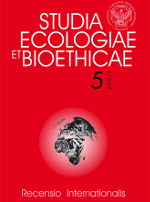Ekologia rodziny w kontekście współczesnego społeczeństwa
Ecology of the family in the context of modern society
Author(s): Wojciech BołozSubject(s): Family and social welfare, Human Ecology, Pastoral Theology
Published by: Wydawnictwo Naukowe Uniwersytetu Kardynała Stefana Wyszyńskiego w Warszawie
Keywords: family;sexual revolution;cohabitation (unregistered marriage); feminism;
Summary/Abstract: The family is a basic and solid part of a social structure, but it is always set in historical and cultural contexts, therefore over the centuries the family has been undergoing constant evolution: the form of the family and its functions change. In post-modern societies family standards are being more frequently abandoned in favour of so called “post-family” family which takes form of cohabitation and alternative ways of living: living alone, mono parentalship and homosexual partnerships. Cohabitation means living together without a formal base. It is undertaken in order to ease a life together, facilitate economic functions of the partnership, accommodate lasting sexual relationship and bring up children. Cohabitation has an open structure, all can be discussed and depends on its members’ will. It doesn’t determine the sex or the number of its member, doesn’t require living together or having children, although it is not exclusive. The factors that lead to the abandonment of a traditional model of the family are: change of the women’s position in the social structure, equal rights, economic independence, separating sexual activity from reproduction, the impact of women movements and diminished meaning of the purpose of a marriage - reproduction. “Freedom from a child” allows to make a better use of time for self fulfilment. All these factors lead to individualization of life, the process of individualization changes the members of the society into self efficient atoms, individuals who reject social life and its limits and only look after themselves, focus on their own development and destiny though many can’t tackle the situation and lose. Ecology of the family, which is understood as the context for human development, comes with help to individuals lost in the era of the individualization of life. A known Werner- Wilson’s concept of ecology of the family includes inner- family relationships, relationships with other families, with a broader socio- cultural environment and natural environment- organic and non organic, in which the long lasting and dynamic process of human development occurs.
Journal: Studia Ecologiae et Bioethicae
- Issue Year: 5/2007
- Issue No: 1
- Page Range: 9-22
- Page Count: 14
- Language: Polish

